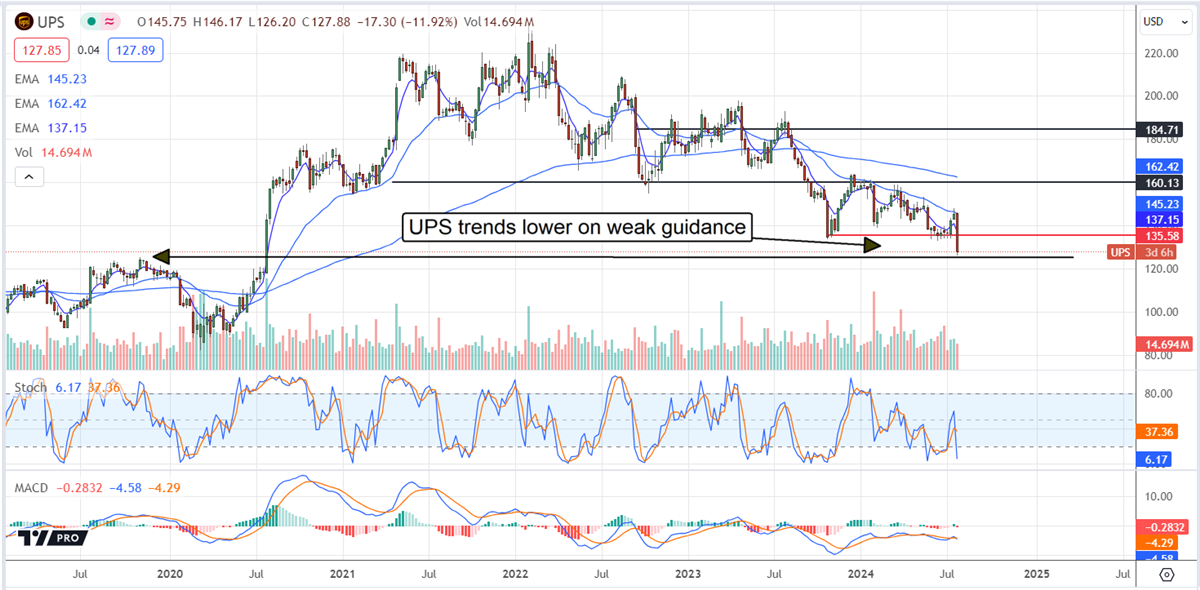
United Parcel Service (NYSE: UPS) turned a corner in Q2, but the odds are high that the rebound won’t start soon or will be vigorous when it does. While volume growth is present, for the first time in over two years, it was weak and offset by other factors that suggest an L-shaped recovery is the best to expect. An L-shaped recovery is marked by a sharp downturn, which the stock is still in, followed by a slow, gradual recovery that may take several quarters, if not years, to complete.
The takeaway is that UPS's business is sound and on track to return to growth, and capital returns are safe, but growth will be tepid for the foreseeable future. The catalyst that could alter this outlook is the Fed and interest rates; the first cut may come soon, but it will take months for the impact to be felt by consumers who drive this business.
UPS Falls on Weak Results: Guidance is Trimmed Again
UPS didn’t have a terrible quarter, but its results were weaker than expected and compounded by reduced guidance. The $21.8 billion in net revenue is down 1.4% versus an expectation for growth and fell short of the MarketBeat.com analysts consensus estimate by 200 basis points. The company logged volume growth only in the U.S. but was offset by price, mix, and weakness in other segments. US fell by 1.9% and International by 1% on a 2% decline in volume. Supply Chain Solutions is the only area of true strength; it grew by 2.6% on strength in logistics and healthcare.
The worst of the news is the margin. The company has worked hard to stabilize and improve margins but failed to follow through in Q2. The Q2 results include the impact of last year’s Teamster negotiations, which greatly increased labor costs. The result is a 30% decline in operating profit and a 29% decline in adjusted operating profits, leaving the adjusted EPS at $1.79, down 30% YoY and 1000 basis points shy of the consensus. The weakness was expected but far outpaced the consensus, weighing on the guidance and the outlook for future profits. The company can recoup some of the costs but will have a hard time doing it: there is only so high that it can raise consumer prices.
Guidance is the straw that broke the markets back. The company reduced its guidance, extending a trend in place for at least six quarters. The new guidance expects $93 billion in consolidated revenue, below the prior midpoint, with margin expected to be 100 basis points lower than previously. The takeaway is that the stock is down more than 10% on the news, trading below critical resistance and showing a strong, trend-following sell signal that could lead to additional downside for this transportation stock.
United Parcel Service to Resume Buybacks; Won’t Support Price Action
United Parcel Service cut share buybacks from its budget in 2020 to preserve capital and sustain a healthy balance sheet. The efforts worked, and the company is in a healthy position if troubled by economic conditions, leading to a reinstatement this quarter. The company is targeting $500 million in buybacks this year and $1 billion annually, worth less than 0.5% of the market cap. The buybacks are a bonus for investors but are not likely to support the market.
Institutions and analysts should not be counted on for market support either. The institutions bought heavily in Q1 but shifted to net-selling in Q2, a trend that has persisted into Q3, and the analysts have been trimming targets. MarketBeat hasn’t tracked any fresh revisions post-release, but they are sure to be negative when they come. Until then, the sentiment is falling in 2024 and dangerously close to Reduce while the price target also trends lower. The consensus forecasts about 30% upside if it stands; based on these results, investors should expect it to continue moving lower in Q3 and provide a headwind for the market.
UPS Falls Below Critical Support
UPS shares fell more than 10% to set a new multi-year low following the Q2 release. The market may consolidate at this new level before making its next move, which will likely be lower. The critical hurdle is the $135 support target, which should now be considered resistance. A move above that level may signal a bottom for the market. However, if the market confirms resistance at or near that level, a fall to $120 or lower is expected.


